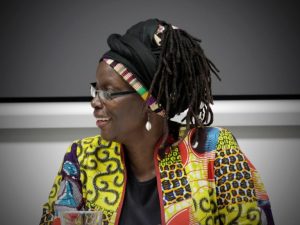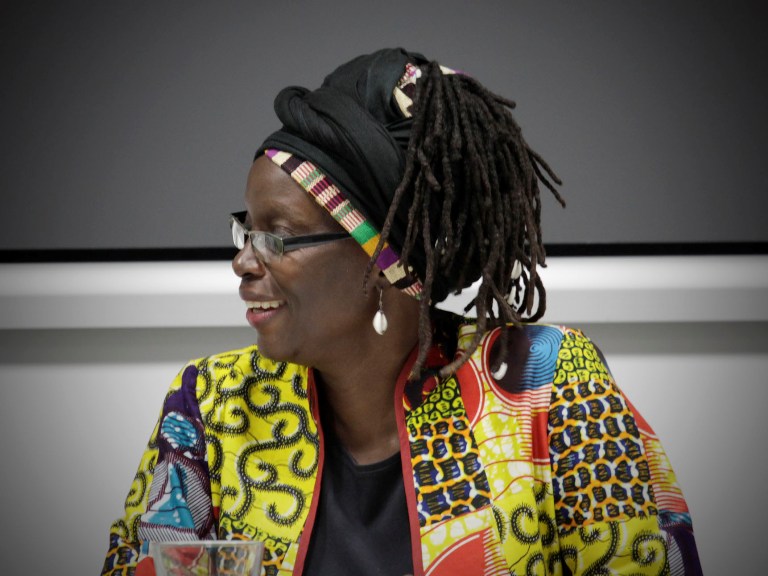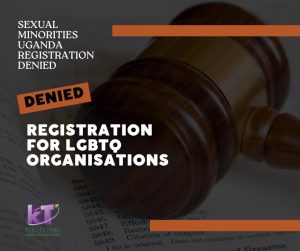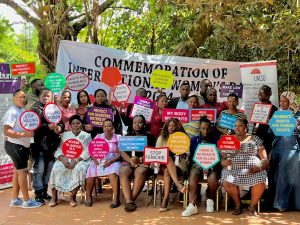By Dr Sylvia Tamale

On 12th February 2012, Dr Sylvia Tamale gave the above titled speech at Imperial Beach Hotel while opening a Freedom and Roam organized workshop under their PAL project. She had earlier presented the same communication at the Pennsylvania State University, on November 2, 2011 and realizing that it was relevant to the sexual and gender minorities’ community in Uganda decided to share it as her opening remarks. First forward, four years later, the Lesbians, Gay, Bisexual, Transgender and Intersex (LGBTI) community in Uganda continues to face the same problems they did back then. In the speech reproduced below, Dr Tamale dissects the beliefs most held by Ugandans towards LGBTI persons and also endeavors to demystify them as well as explain the liquidity of gender and sexuality.
Introduction
Of Nelson Mandela’s many wise sayings, one of my favorite is the old maxim: “Where you stand depends on where you sit.” Since we are also talking about sexuality, I would add that where you stand also depends on where (and how) you sleep. Hence the title of my presentation today: Standing, Sitting and Sleeping. This simple but poignant statement attests to the fact that the views and attitudes that people hold regarding sexuality, the powers that they wield in the name of culture, morality and religion and the control they seek to exercise over the sexuality of others, all have a direct bearing on their social and political orientation. Indeed, as the last bastion of gender inequality and social exclusion, sexuality has become a metaphor for dictatorship in Africa and elsewhere. It is not surprising that in the last two years alone, we have seen legislation seeking to negatively and hegemonically address the issue of sexuality in Uganda, Nigeria, Rwanda and Burundi, to mention just a handful of African countries where these questions are surfacing in bold relief. There is no doubt that the issue of sexual orientation and gender identity (SOGI) is becoming one of the defining questions in the governance and democratization debate on the continent today.
Against the backdrop of a critical surfacing of some of the key issues affecting the issue of sexuality and drawing particularly from my experience in Uganda, my lecture seeks to offer some reflections on the manner in which governance questions in Africa today are intricately related to the twin issues of sexuality and gender identity. The main point I would like to underscore is that the intensive scrutiny, regulation and control of non-conforming sexualities and gender identities reflect both a deep historical connection to colonial structures of governance and marginalization, and to more contemporary attempts to control the body. In this way, sexuality is deployed as a tool for perpetuating patriarchy, inequality, and injustice and to consolidate the process of othering.
Many people regard Nelson Mandela as one of the greatest leaders of our times. Very few however, associate him with the issue of sexuality. I first heard the saying, “Where you stand depends on where you sit” being articulated by Mandela. Although he is not the originator of the saying, it seems most appropriate to attribute it to the man who is iconized for his tolerance and desire to build bridges rather than walls. In this connection, it is important for us to recall that Mandela presided over the introduction of one of the most progressive constitutional instruments ever written.
In the internal African National Congress (ANC) debates leading up to the end of apartheid and thereafter, Mandela emphasized that the struggle against racial discrimination was fought by everybody, irrespective of their religious beliefs, their ethnic backgrounds, and of their gender. More importantly, Mandela was a strong proponent for the inclusion of a provision in the constitution of a new South Africa explicitly outlawing discrimination on the grounds of sexual orientation. Hence, the South African constitution became the first in the world to explicitly outlaw discrimination on the grounds of non-conforming sexualities.
I am from Uganda. Yes, that country that so few of you can pinpoint on the world map but which has recently become world famous as the locus par excellence of homophobia, thanks to its infamous Anti-Homosexuality Bill. Uganda is one of the few countries globally that also has a Cabinet minister with a portfolio responsible for Ethics and Integrity.
One would imagine that this government department was created for fighting graft and corruption, promoting transparency and accountability and building democratic integrity and disseminating principles of good governance. This is especially so because Uganda was ranked the 11th most corrupt country worldwide in the year 2000 by Transparency International, two years after the Ministry came into existence. However, this ministry is more famous for its work in policing issues related to sex than fighting corruption and mismanagement. In 2003 Dr. Nsaba Buturo was transferred from the Ministry of Information (read propaganda) to steer Ethics and Integrity, where he remained for eight years. Under his stewardship, the ministry’s single-most important brief was to regulate and control the sexuality of Ugandans, particularly those who practice non-conforming sexualities.
Sexuality as a Critical Governance Issue: The Case of Uganda
As we all know, the patriarchal capitalist state creates an artificial institutional and legal separation of the public (politics/the market) and private (domestic/family, including sexuality) spheres. While public life is characterized by intricate regulation by the State, the private realm concerning the family is largely left to the control of the so-called “head of the family.” There has always been one exception to this rule: the regulation of sexual relations remains in the hands of the State. Michel Foucault illuminated State sexual politics by conceptualizing sexuality as a “disciplinary technology of power” (Foucault 1980). Through repression and criminalization, sexuality outside heterosexual marriage (e.g., adultery, prostitution, fornication, same-sex erotics) is marked as dangerous and polluting. On the other hand, polygynous heterosexual relations (preferably in missionary position) are legitimized and valourized. This means that the state strategically deploys sexuality to consolidate its stranglehold on power.
President Yoweri Museveni has ruled Uganda for the past 25 years under the National Resistance Movement (NRM). While he is widely recognized for his achievements in economic and political reform, it is Museveni who created the Ministry of Ethics and Integrity. And it is my contention that this government department was created almost exclusively for one specific purpose. The objective was not to monitor political ethics in public offices, because Uganda already had the office of Ombudsman that performed the anti-corruption duty, and a human rights commission to combat state-inspired violations against individual citizens. Rather, the Ministry was created primarily as a disciplinary and surveillance body to focus on the sexual morality of Ugandans. By so doing, the NRM administration understood that if performed effectively, this mandate would act as chief detractor in diverting the attention of Ugandans from the real issues of governance and democracy. What better deflector than using the emotive instrument of sexuality? Like other historical dictatorships elsewhere in the world, the main target would be the sexualities of powerless social groups such as homosexuals and prostitutes. Adolf Hitler used the same tactics in Germany as did the McCarthyist movement in the USA, turning sexual minorities into scapegoats and blaming them for virtually every social and political wrong. In this way, the issue of morality is used as a convenient smokescreen for the real agenda of political and social dictatorship. In this case it was the imagined immorality of “recruiting Uganda’s youth into homosexuality” that provided the raison d’etre for what was described as the noble cause of protecting the family from external and foreign influences.
In fact “moral panics” are an old-and-time-tested political strategy that sows hatred and division in the populace, while at the same time deflecting attention onto a convenient scapegoat. On the African continent homophobic witch hunts have been used successfully by Presidents Robert Mugabe of Zimbabwe, Arap Moi of Kenya, Sam Nujoma of Namibia, Bingu wa Mutharika of Malawi, Olusegun Obasanjo of Nigeria and Abdoulaye Wade of Senegal. When nonconforming sexualities are used to cover up real socio-political issues such as high unemployment, run-away inflation, below-average wages, high taxes, an extremely high cost of living and the poor state of healthcare, they become a metaphor for bad governance and repression.
Returning to the Ugandan Ministry of Ethics and Integrity, Nsaba Buturo executed his mandate with such severity that he was solidly behind MP David Bahati when he tabled the Anti-Homosexuality Bill in October 2009. He condemned homosexuality at every opportunity and made it his bête noire at every possible opportunity. At a religious gathering in Kampala, tagged “Call Uganda” where the American evangelist, Lou Engle spoke, Buturo did not mince his words about his work on behalf of the Almighty:
I know Bahati has heard the voice of God and is now spearheading that bill in Parliament… It is your business that you pray for him. It is your business that you pray for the members of parliament. That on the day appointed for voting, there will be no Member of Parliament that will be absent… that the bill will be passed without any debate…. Uganda will not accept that nonsense that says that homosexuality is a human right. It is an abomination. We are going to tell all that care to listen… that our dignity is not for sale, that our love of God is first and foremost.
In both 2008 and 2010 Nsaba Buturo banned regional conferences organized by Ugandan sex workers to discuss their health rights interests. In an intimidating letter that he sent to the hotel hosting the conference, and copied to the Minister of Internal Affairs and the Inspector General of Police, Buturo wrote:
It has come to my knowledge that an organization known as Akina Mama wa Afrika is planning to conduct a seminar for prostitutes at your hotel from 18th to 20th November 2010. I am reliably informed that participants will come from Uganda, Kenya and Tanzania. If this information is correct, and we will soon find out, I should inform you that prostitution is a criminal offence in Uganda. By allowing your premises to Akina Mama wa Afrika for purposes of conducting this seminar, it is concluded that the hotel is an accomplice in an illegality.
This is therefore to inform you that government will not find it acceptable that management of Serena Victoria Hotel should be promoting and defending a criminal act.
I must point out that in Uganda it is the act of exchanging sex for money that amounts to a criminal offence. The freedoms of association and speech, on the other hand, are guaranteed in the Constitution. But through that letter, Buturo achieved his goal. Serena cancelled the conference and the local media spent several days focusing on sexual morality and diverting from the real issues of the day.
The machinations of the Ethics and Integrity Ministry were also seen in the passage of the Equal Opportunities Commission Act in 2006. Although constitutionally provided for, government took its time to establish the EOC and only did so, on account of pressure from civil society. The EOC law was designed to create “…a just and fair society where all persons have equal opportunity to participate and benefit in all spheres of political, economic, social and cultural life.” In other words, the EOC was created to address the concerns and exclusion of vulnerable minorities. Section 15 of the EOC Act is the key provision of the law with respect to its operationalization by elaborating the powers of the Commission which are equivalent to a civil court. In a bid to ensure that homosexuals and prostitutes would never be able to access the EOC for redress, at the eleventh hour of debate on the bill parliament inserted, the following provision into the final law:
The Commission shall not investigate any matter involving behaviour which is considered to be—immoral and socially harmful, or unacceptable by the majority of the cultural and social communities in Uganda. [See Section 15(6)(d)]
The Hansard record elaborates how legislators came to cast the homophobic and discriminatory net over the EOC. While supporting the amendment, the Minister of Gender argued:
[I]t is very important that we include that clause. This is because the homosexuals and the like have managed to forge their way through in other countries by identifying with minorities. If it is not properly put in the clause, they can easily find their way through fighting discrimination. They can claim that since they are part of the minority, they can fight against marginalisation.Such a clause was clearly misplaced in a legislation that was meant to address issues of marginalisation that affect “social minorities” and to ensure that they are accorded equal opportunities as “social majorities.” To say that the EOC requires the authorization of the “social majority” in order to address the issues and concerns of “social minorities” simply defeated the core purpose of the legislation. It was a classic case of giving with one hand and taking away with the other. Indeed, it also unduly constrained the Commission from exercising the power of discretion, which is a basic feature of protective institutions such as courts, or human rights commissions. Most important is the fact that section 15(6)(d) is repugnant to the basic principles of substantive equality enshrined in Uganda’s constitution. It quite clearly has no place in a democratic society committed to a fully-fledged system of minority protection.
But to further prove that the Ministry of Ethics and Integrity was not designed for public accountability issues is the story of the chief ethics policeman himself being caught with his hand in the cookie jar and getting away with it. In the irony of ironies, in 2006 “man of God” Buturo misappropriated Ushs 20 million (approximately USD 10,000) that belonged to an upcountry FM station. Parliament investigated the embezzlement and ordered him to refund the money. Buturo acknowledged taking and using the money, but even after doing so, continued serving as the government watchdog for ethics and integrity. It was business as usual.
But lest I be misunderstood, it is crucially important to appreciate that the instrumentalization of sexuality as a political tool is not limited to African dictators. When the anti-Homosexuality bill was tabled in Uganda, a number of Western government leaders called on Uganda to recognize the sexual citizenship of all its people. Overnight the Bill turned into a “conditionality” for aid to government and non-governmental human rights organizations alike (Ewins 2011). Prior to the AHB debacle Ugandan human rights activists had shouted themselves hoarse regarding rigged elections, detentions-without-trial, the abuse of media freedoms, corruption and many other human rights violations. Western governments failed to lift a finger in condemnation of such practices, and were cosily in bed with Museveni who they dubbed one of only a handful of a ‘new breed’ of African leaders. The selective conditionality when it comes to the rights of LGBTI individuals therefore smacks of both hypocrisy and selective amnesia. In a strongly-worded October 2011 statement signed by several African Social Justice Activists, it was clarified:
The imposition of donor sanctions may be one way of seeking to improve the human rights situation in a country but does not, in and of itself, result in the improved protection of the rights of LGBTI people. Donor sanctions are by their nature coercive and reinforce the disproportionate power dynamics between donor countries and recipients. They are often based on assumptions about African sexualities and the needs of African LGBTI people. They disregard the agency of African civil society movements and political leadership. They also tend, as has been evidenced in Malawi, to exacerbate the environment of intolerance in which political leadership scapegoat LGBTI people for donor sanctions in an attempt to retain and reinforce national state sovereignty.
Further, the sanctions sustain the divide between the LGBTI and the broader civil society movement. In a context of general human rights violations, where women are almost as vulnerable as LGBTI people, or where health and food security are not guaranteed for anyone, singling out LGBTI issues emphasizes the idea that LGBTI rights are special rights and hierarchically more important than other rights. It also supports the commonly held notion that homosexuality is ‘unAfrican’ and a western-sponsored ‘idea’ and that countries like the UK will only act when ‘their interests’ have been threatened.
Not much more needs to be said about this issue, save to emphasize that the differentials of race,power and economics have also found their way into the contemporary debate over sexuality and gender identity on the African continent. What is perhaps most galling is the over-drive production in the West of media portrayals of the developments around the AHB in a country like Uganda that completely ahistoricize and ‘otherize’ the phenomenon of homophobia, as if it has never existed in Western countries. Documentaries such as the BBC’s The Worst Place to Be Gay gloss over the fact that so many of the legacies of institutionalized homophobia and gender-identity discrimination were written into the political economy of our countries through the colonial experience. The Indian Naz Foundation case made this abundantly clear in declaring the Victorian-era Section 377 of the Penal Code which criminalized homosexual relations, as unconstitutional. Section 377 was reproduced verbatim in all the criminal codes of ex-British colonies, of which Uganda was one.
True Integrity and Honour: Lessons from Nelson Mandela
Even as we celebrate Africa’s great hero, Nelson Mandela today, we must never lose sight of the fact that he is (and has always been) a fallible human being. Many of us have the tendency to focus on the man/saint, projecting a static idolization on a critical figure that was so important in the South African democratization and reformist trajectory. However, such a stance has its limitations, particularly in stifling the narratives and histories of those social groups whose stories may not necessarily match the common accessible narrative of the hero. It is my contention that it is only in recognizing such multiple voices and trajectories that “real” democratization will happen. Nelson Mandela himself has said, “I’m an ordinary person, I have made serious mistakes, I have serious weaknesses” (Crwys-Williams 2010: 48).
Today Nelson Mandela stands tall as a great icon of the rights of homosexual individuals. But Mandela’s perspective on gays was not this liberal when he started out on his political career. Indeed, his viewpoint on homosexuality has evolved from the conservative opposition that he held in the 1950s and ’60s to the full support of gay rights that he holds today. Even Desmond Tutu—currently one of the key proponents of gay rights globally—denounced homosexuality in 1973 as one of the most dehumanizing effects of the migrant labour system (Epprecht 2008: 169).
The point is that Nelson Mandela and his colleagues including, Tutu, Oliver Tambo and Thabo Mbeki were open-minded enough to carefully listen to some of their colleagues in the early anti-apartheid movement, empathize and make the parallels between racial and sexual apartheid. Anti-apartheid activists such as Cecil Williams and Simon Nkoli openly challenged the ANC’s Christian-influenced homophobia, effectively shifting the thinking of its leadership over time (Epprecht 2008: 184-5). Moreover, the decades that Mandela spent in prison allowed him to reflect on his prejudices and mental positions on a lot of issues. In Long Walk to Freedom he writes:
It was during those long and lonely years that my hunger for the freedom of our own people became a hunger for the freedom of all people, white and black. I knew as well as I knew anything that the oppressor must be liberated just as surely as the oppressed. A man who takes away another man’s freedom is a prisoner of hatred, he is locked behind bars of prejudice and narrow-mindedness. I am not truly free if I am taking away someone else’s freedom, just as surely as I am not free when my freedom is taken from me. The oppressed and the oppressor alike are robbed of their humanity. When I walked out of prison, that was my mission, to liberate the oppressed and the oppressor both. (p. 544)
After Mandela’s historic release from prison in February 1990, he led the ANC in the negotiations that led to the dismantling of formal apartheid. As pointed out earlier, in May 1992 the ANC added a commitment in its manifesto to entrench sexual orientation as a category of human rights that would be constitutionally protected against discrimination in post-apartheid South Africa, eventually leading to the landmark inclusion of sexual orientation discrimination in the 1996 Constitution (Epprecht 2008, 189; Cameron 2002).
The country’s history of inequality and oppressive injustice taught the constitution-makers that “irrelevant and stigmatizing criteria should not be used as a basis for judging people and their legitimate place in society” (Cameron 2002: 645). The ANC under Mandela was thus well ahead of its time; this was a whole 20 years before we get legislation such as the AHB in Uganda! What further evidence do we need to show that Mandela is a man deeply in touch with what it means to change?
African leaders such as Bahati and Buturo who preach homophobia need to tap into the classical African tradition of Ubuntu, a concept most clearly articulated to the world by Mandela. In Luganda we refer to Ubuntu as Obuntu Bulamu, and several other African communities have similar expressions for a concept that is fairly common around the continent. This hard-to-translate concept encompasses many values—humaneness, solidarity, interdependence, compassion, respect and dignity.
It rejects selfish, paternalistic, restrictive rules issued by rulers riding high moral horses in complete disregard of the interests of their neighbours, their community and their fellow human beings. Mandela’s leadership was greatly enriched by this philosophy. He said: “In Africa there is a concept known as Ubuntu – the profound sense that we are human only through the humanity of others; that if we are to accomplish anything in this world, it will in equal measure be due to the work and achievements of others.” By way of concluding my speech, I would like to reflect on the phenomenon of Ubuntu by recreating an imaginary conversation between Nsaba Buturo and Nelson Mandela.
Conclusion: A Conversation between Nelson Mandela and Nsaba Buturo
Mandela and Buturo met in the corridors of the headquarters of the African Union in Addis Ababa at the beginning of this year. The bulk of Mandela’s words in this conversation are lifted verbatim from real quotations that he has made in the past as reported in the Crwys-Williams collection, In the Words of Nelson Mandela. Buturo’s words are mostly culled from the speeches and interviews that he gave over the eight years as Ugandan Minister of Ethics and Integrity.
B: [With big smile and outstretched arm] It is such an honour to meet you President Mandela. I never dreamed that I would have such a blessing in my lifetime.
M: Good to meet you too Mr. Buturo, the Ugandan Minister of eh…
B: Ethics and Integrity sir.
M: [Half-instinctive, half-calculating response] Interesting. I hear you are a strong supporter of the Anti-Gay bill in your country.
B: Homosexuality in Uganda and Africa as a whole is a taboo. How can a man sleep with a fellow man or a woman with a fellow woman?
M: There was a time when I reacted with revulsion against the whole system of being gay.
B: Who corrupted your mind then?
M: I was ashamed of my initial views, coming from a society which did not know this type of thing. I understand their position [now], and I think they are entitled to carry on with what pleases them.
B: It is not natural in Uganda. What we are doing is what the country wants. Ugandans also believe that anal sexual intercourse, foreign objects used in sexual intercourse and promiscuity do not deserve to be defended at all. It’s abhorrent that homosexuality should be recognized as a way of life.
M: Well, my brother, you need to rethink your policy. The millions of graves strewn across Europe which are the result of the tyranny of Nazism, the decimation of the native peoples of the Americas and Australia, the destructive trail of the apartheid regime against humanity—all these are like a haunting question that floats in the wind: why did we allow these to happen? Never and never again shall the laws of our land rend our people apart or legalise their oppression and repression.
B: Oh no, no, no, Mr. Mandela. With all due respect, homosexuality will never be promoted, encouraged or supported in Uganda. Ever since the Bill was presented in Parliament, there have been various reactions as well as over-reactions from countries which are annoyed at our independence to enact our Laws. Consequently, we hear they are threatening to take action against Uganda. We wish to remind the donors that there is integrity to be defended and threats are not the way to go. We are really getting tired of this phrase, human rights. It is important that we do not compromise on the values that we stand for.
M: Uganda has a Constitution, right? A Bill of Rights is a living thing. To deny any person their human rights is to challenge their very humanity. No true alliance can be built on the shifting sands of evasions, illusions, and opportunism… [Stares straight into Buturo’s eyes]. One of our strongest weapons is dialogue. Let us refrain from chauvinistic breast-beating: [in South Africa we do] not underrate what we have achieved in creating a culture in which we increasingly respect the dignity of all.
B: [Adamant] Hmm… Even at the United Nations there are attempts by some nations to impose homosexuality on the rest of us… We have learned that they want to smuggle in provisions on homosexuality. Homosexuals can forget about human rights. Uganda will not be forced to legalize practices that are illegal, unnatural and abnormal.
M: Listen, my young brother. A man who takes away another man’s freedom is a prisoner of hatred. None of us can be described as having virtues or qualities that raise him or her above others.
B: Perhaps what we need to add to the bill is a provision for reparative therapy to attract errant homosexuals to acceptable sexual orientation.
M: Listen brother, I am nearing my end. I want to be able to sleep until eternity with a broad smile on my face, knowing that the youth, opinion-makers and everybody is stretched across the divide, trying to unite the nation. And I hope you will join them: Good day Mr. Buturo.
At this point, I walked away thinking about how Buturo had represented me as a Ugandan. I wondered to myself, Ain’t I a Ugandan? Whose culture was he talking about? Whose morality? Whose sexuality? I guess it all depends on where you’re sitting or how you’re sleeping.
Thank you for listening to me ladies and gentlemen.
References
Cameron, Edwin (2002), “Constitutional Protection of Sexual Orientation and African Conceptions of Humanity,” South African Law Journal 118(4): 642-650
Crwys-Williams, Jennifer (ed.) (2010), In the Words of Nelson Mandela, London: Penguin Books Ltd.
Epprecht, Marc (2008), Unspoken Facts: A History of Homosexualities in Africa, Harare: GALZ
Ewins, Lucy (2011), “The Criminalization of Sexual Orientation: Why Uganda’s Anti-Homosexuality Act Threatens its Trade Benefits with the United States,” Boston College International and Comparative Law Review 34(1): 147-171
Foucault, Michel (1980), The History of Sexuality, Vol. I, An Introduction, London: Penguin Books
Mandela, Nelson (1995), Long Walk to Freedom, Boston and New York: Little Brown & Co.
Miles, Rufus (1978), “The Origin and Meaning of Miles’ Law,” Public Administration Review 38(5): 399-403




